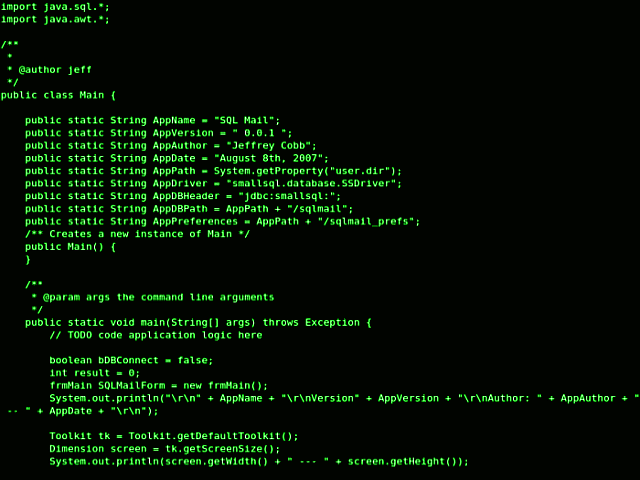El día 31 de marzo ha sido marcado en el calendario por Anonymous como el día en que el grupo de hacktivistas pretende hacer su mayor ataque en la red hasta el momento, atacando a 13 servidores clave. Esta declaración de intenciones ha sido publicada por Pastebin, un sitio web donde Anonymous suele lanzar sus amenazas o reconocer sus ataques.
Twitter
Comenzando con una frase que parece atacar al propio usuario: "el mayor enemigo de la libertad es un esclavo feliz", la intención de este grupo enmascarado es protestar por la ley SOPA, Wallstreet, "los irresponsables líderes" y los banqueros mediante la saturación de Internet.
Nadie será capaz de llevar a cabo una búsqueda de nombres de dominio
Con el fin de llevar a cabo este apagón, Anonymous deja una lista de los trece servidores raíz, que son los servidores de nombre de dominio (DNS) que saben dónde están los servidores de nombres autoritarios para cada una de las zonas de más alto nivel de Internet.
Al acabar con estos trece servidores, según Anonymous, "nadie será capaz de llevar a cabo una búsqueda de nombres de dominio", y por consiguiente se llevará a cabo la desactivación de HTTP, que es la función más utilizada de la web.
Es decir, si alguien entrar por ejemplo en "http://www.google.com" o cualquier otra dirección URL, recibirá un mensaje de error, "por lo que pensará que Internet ha caído", aunque en realidad no se trate de eso. La verdad es que Anonymous se ha esforzado en el comunicado en explicar todos los aspectos técnicos de cómo van a llevar estar tarea a cabo.
Para el ataque se utilizarán direcciones IP estáticas, lo que les permite mantener el ataque, incluso hasta mientras que Internet esté fuera de servicio. Además aseguran que "el hecho mismo de que nadie sea capaz de usar Internet, ralentizará el trabajo de los que intentan detener el ataque".
No concretan la duración del hipotético ataque, pero afirman que puede ser de una hora hasta días. Pero lo que sí tienen seguro es que será nivel global.
Para concluir su comunicado, a parte de incluir su famoso lema "Somos Anonymous. Somos legión (...)", han querido incluir una frase del expresidene norteamericano Benjamin Franklin que dice "Aquel que sacrifica la libertad por seguridad, no se merece ninguna de ellas".
n order to shut the Internet down, one thing is to be done. Down the
13 root DNS servers of the Internet. Those servers are as follow:
A 198.41.0.4
B 192.228.79.201
C 192.33.4.12
D 128.8.10.90
E 192.203.230.10
F 192.5.5.241
G 192.112.36.4
H 128.63.2.53
I 192.36.148.17
J 192.58.128.30
K 193.0.14.129
L 199.7.83.42
M 202.12.27.33
By cutting these off the Internet, nobody will be able to perform a
domain name lookup, thus, disabling the HTTP Internet, which is,
after all, the most widely used function of the Web. Anybody entering
"http://www.google.com" or ANY other url, will get an error page,
thus, they will think the Internet is down, which is, close enough.
Remember, this is a protest, we are not trying to 'kill' the Internet,
we are only temporarily shutting it down where it hurts the most.
While some ISPs uses DNS caching, most are configured to use a low
expire time for the cache, thus not being a valid failover solution
in the case the root servers are down. It is mostly used for speed,
not redundancy.
We have compiled a Reflective DNS Amplification DDoS tool to be used for
this attack. It is based on AntiSec's DHN, contains a few bugfix, a
different dns list/target support and is a bit stripped down for speed.
The principle is simple; a flaw that uses forged UDP packets is to be
used to trigger a rush of DNS queries all redirected and reflected to
those 13 IPs. The flaw is as follow; since the UDP protocol allows it,
we can change the source IP of the sender to our target, thus spoofing
the source of the DNS query.
The DNS server will then respond to that query by sending the answer to
the spoofed IP. Since the answer is always bigger than the query, the
DNS answers will then flood the target ip. It is called an amplified
because we can use small packets to generate large traffic. It is called
reflective because we will not send the queries to the root name servers,
instead, we will use a list of known vulnerable DNS servers which will
attack the root servers for us.
DDoS request ---> [Vulnerable DNS Server ] <---> Normal client requests
\
| ( Spoofed UDP requests
| will redirect the answers
| to the root name server )
|
[ 13 root servers ] * BAM
Since the attack will be using static IP addresses, it will not rely
on name server resolution, thus enabling us to keep the attack up even
while the Internet is down. The very fact that nobody will be able to
make new requests to use the Internet will slow down those who will try
to stop the attack. It may only lasts one hour, maybe more, maybe even
a few days. No matter what, it will be global. It will be known.
¿Que creen ustedes? Saludos desde Bolivia.

|
 |
Bienvenido(a), Visitante. Por favor Ingresar o Registrarse ¿Perdiste tu email de activación?. |



 Autor
Autor




 En línea
En línea














